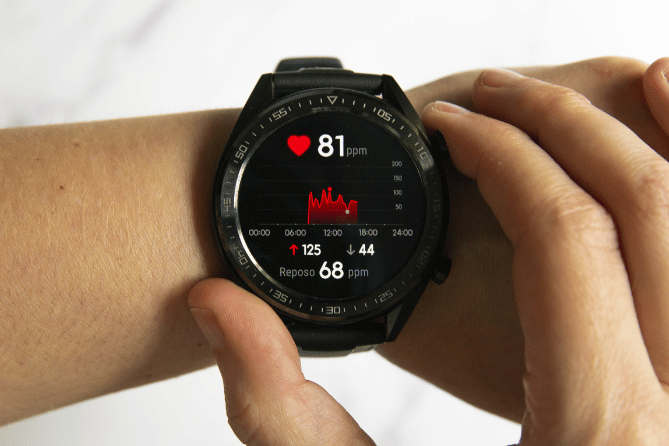So you’re all hopped up on fitness and you’re looking for a way to take your workout to the next level. You’ve heard that running at a higher heart rate can help you burn more calories and get in better shape, or want to participate in a marathon to see how far you can push yourself.
Surely, running at 90% of your max heart rate can land you a respectable finish in a marathon or count as an awesome day in the gym. But how long can you keep it up? Don’t be anxious, as it turns out a regular person can run for an hour at 90 percent of max heart rate.
But don’t start running just now, you need to look at a few other things. Intrigued? Read on to find out more…
Is 90 a good exercise heart rate?
Maximum heart rate indicates how fast your heart could be beating. It is an important measure to stay healthy. The average person uses about 50-60% of their maximum amount. During marathons or workouts, a regular person should focus to use up 60-75% of maximum heart rate at best.
Athletes are a different breed. Since they work with all sorts of exercise equipment and want to tone their body as soon as possible, for them being at 90% isn’t a big deal.
This means if you’re an athlete and want stronger, more efficient workouts then it’s best for you to reach those high numbers. Even if you’re planning to run a marathon, 70% of your max heart rate is enough to participate.
Unless you’re planning to be the first one to win a marathon or a race, you don’t need to go above 85%. Because as a normal person with no/slight workout sessions, exceeding those numbers means developing bad habits called overtrained.
So, for regulars, 90% of max heart rate isn’t optimal. But athletes can reach that after taking advice from their trainers. The American heart association also suggests the same.
How to determine your ideal running heart rate
You have to find out what your target is before calculating your running heart rate. In other words – if someone’s goal were simply just getting into better physical shape then they would likely choose something around 60% of their maximum possible output.
However, runners who compete at ultra-distance events need even more. Besides, you also need to factor in age and body type as well. Meaning, there’s no simple answer. But that doesn’t mean there’s no ideal rate at all.
If you’re going for vigorous exercise, your ideal running heart rate should be between 70%-85%, depending on your physical condition. For moderate exercises, 50-70% is ideal. If you’re just starting out, start from 50% and then gradually go above.
But we’re not done yet. You only found out percentages, you need to know your maximum heart rate and then figure out where the numbers are.
How to determine maximum heart rate while running
There are many ways to determine your maximum heart rate, but the most common way is by subtracting age from 220. If you’re 30 years old then that would give a result of 190. Then all you have to do is get a calculator and find out your target heart rate zones.
Below is a general guideline for maximum heart rate for different ages. You can refer to this when you’re running and doing other exercises:
| Age | Target heart rate, 50% [bpm] | Target heart rate, 85% [bpm] | Maximum heart rate, 100% [bpm] |
| 20 years | 100 | 170 | 200 |
| 30 years | 95 | 162 | 190 |
| 40 years | 90 | 153 | 180 |
| 50 years | 85 | 145 | 170 |
| 60 years | 80 | 136 | 160 |
| 70 years | 75 | 128 | 150 |
I really have to stress that this heart rate exercise chart just a generic benchmark. For different purposes, you’ll have to raise/lower the numbers by 15/20 bpm. Athletes generally need a specific heart rate zone, which is why they should consult an expert physician or a doctor.
Can I surpass my maximum heart rate?
Exercising above your target heart rate could actually do more harm than good. And if you have diabetes or any coronary disease, it’s a big no-no. If you have no such illnesses, you can go further than the upper limit without serious consequences, but you could hurt your musculoskeletal system.
This is because exercising at such a high intensity puts a lot of strain on your joints and muscles. So if you’re looking to improve your cardiovascular health, it’s important to find an exercise routine that works for you and doesn’t put your body at risk.
How to calculate your heart rate?
You can find your pulse by feeling for the carotid arteries, which are located just below the angle of the jaw. Once you’ve located the arteries, place your fingers lightly on them and count the number of beats you feel in 15 seconds. To get your heart rate per minute, simply multiply this number by 4.
So, if you counted 10 beats in 15 seconds, your heart rate would be 40 bpm (beats per minute). Stadiometers can also be used to measure heart rate. Nowadays there are also smartwatches that can monitor heart rate.
Parting words
How do you feel about running at 90% of your max heart rate now? I know, running for only minutes sounds too less, considering there are people who exercise 4-5 hours a day.
But don’t worry, that doesn’t mean you have to stop running after just one hour! You can always mix in a few sprints or high-intensity intervals to keep things interesting and push your body even further. Just make sure you give yourself enough time to recover before your next workout.







